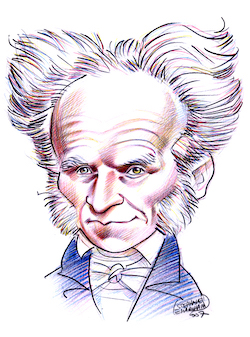The art of always being right
Schopenhauer's argument is a constructed cry, consisting in essence of speaking louder than one's opponent, if necessary insulting him. This argument is typical of the approach which, believing itself to preserve philosophical purity, cynically degrades sophistry, abyss philosophy by reducing it to a caricature that is as pure as it is unreal, and distorts the gymnastics of argument into a mere modality of insult. What a curious conception of the art of being always "right"!
Aristotle
Opposed to Schopenhauer is the approach of Aristotle. Aristotle allows for non-rational registers of argumentation, while recognising the qualitative primacy of reason.
Dear Aristotle! Here is a philosopher who, comfortably curled up in the hollow of the fourth century BC, when he is not brooding in his bosom Alexander, the greatest conqueror of his time, exhausts most of the subjects he tackles.
The epistemological divergence between Aristotle and Plato, his teacher, is that if Plato reasoned a priori, without considering empirical reality, and despising it; Aristotle never spoke of a subject before he had studied its actual embodiments.
The Republic of Plato was born from the flashes of his mind; the Policies Aristotle's writings emerge from a careful and prior consideration of the actual constitutions of one hundred and fifty-eight Greek cities.
"Ethos - logos - pathos
The art of always being right? The timelessness of Aristotle is verified in the field of rhetoric. So much so that the Aristotelian triptych "Ethos - logos - pathos" was the vulgate throughout Antiquity, like an obligatory reference.
Let us consider how the three aspects of the persuasive relationship are linked.
Clearly, their relationship is dynamic, as an argument can appeal to both the reason and the emotions of our interlocutor; and the rational force of an argument will seem all the greater the more it emanates from a recognised authority.
Aristotle's reason, or Schopenhauer's violence?
Does one of these registers occupy a position of superiority over the other two?
Theoretical minds proud of reason - as are many scientists - are tempted to immediately acknowledge the primacy of reason. Well, what! Are we beings of instinct? Are we not first and foremost beings of reason? Was it by appealing to feelings that Einstein triumphed over his opponents, or that quantum theory was imposed? Let's leave emotions to the religious minds, let's get serious again: Reason dominates!
This thesis is attractive and contains some truth.
From a strict qualitative point of view, it is impossible not to recognise the primacy of the logos. It is never persuaded that from something; a proposal, the formulation of which is, in fact, entirely up to the logos. Mobilising the feelings and deference of an audience is all well and good, but we still need to have something to 'sell' them! This 'qualitative' primacy of the logos hardly seems questionable.
But alone, the logos is nothing. The other two aspects condition the audibility of a rational proposition. Thus Einstein had the greatest difficulty not only in gaining recognition, but in getting published, because his ethos in the scientific community was zero - he worked at the Patent Office in Bern, not exactly the quintessential international scientific institution! His scientific authority was non-existent; he represented nothing and no one to the peer review committees. A scientific argument that is not published does not exist.
The art of always being right
From a strictly quantitative - and no longer qualitative - point of view, it seems that logos actually occupies a subordinate position to ethos and pathos.
In a remarkable synthesis of the Harvard Business ReviewCarmine Gallo shows that "narrative accounts for an average of 65 % of the discourse, logos for 25 % and ethos for 10 %. In other words, the winning formula (...) is to package a great idea in a story. Very American, as a formula; pragmatic, empirical, pithy and true.
Cogito Library, 2023. L'art d'avoir toujours raison and the resources labelled 'Bibliothèque Cogito' may be freely taken, quoted, copied, even in their entirety, on the sole condition that a hyperlink to the page of the borrowed resource is included.


